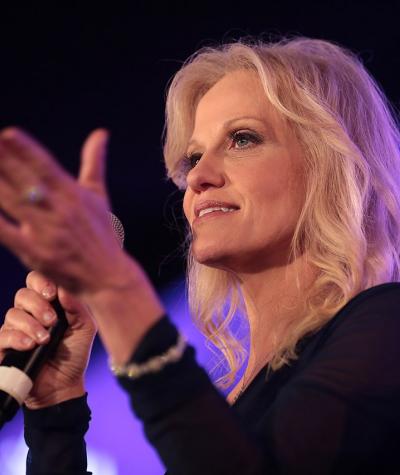CLC filed a complaint against White House counselor Kellyanne Conway with the U.S. Office of Special Counsel (OSC) for again abusing her official authority to influence an election. This is Conway’s third brazen violation of the law.
Conway recently gave two interviews from the White House lawn where she pivoted, unprompted, to attack a presidential candidate, Joe Biden. This violates the Hatch Act, which prohibits federal employees from using their official position to promote the election or defeat of candidates for partisan political office.
Last year, following CLC’s complaints, OSC determined that Conway violated the Hatch Act by using interviews with Fox & Friends and CNN’s New Day to advocate against the election of then-Senate candidate Doug Jones. OSC referred the matter to the President for appropriate disciplinary action—but it appears she has faced few consequences.
Conway’s most recent violation occurred under strikingly similar circumstances. In interviews on April 30 and May 1, 2019, Conway delivered remarks disparaging Biden. She criticized Biden’s endorsements, his record as vice president, and the policy positions he has taken while a candidate.
Conway made these remarks in her official capacity: she discussed official topics alongside the partisan political attacks, and she was on White House property, with the White House and the Executive Office buildings clearly visible in the background. This conduct amounts to an obvious attempt to advocate for the defeat of candidate Biden, in violation of the Hatch Act.
Strict compliance with Hatch Act is necessary to keep partisan politics independent from the administration of federal programs, and to ensure officials do not use their entrusted authority to affect the political process. When the Hatch Act is properly enforced, it strengthens the public’s confidence that public officials are working in the best interests of everyone, and not using their influence to install political allies throughout government.
But compliance depends on public officials who are committed to their ethical obligations, and superiors who set a strong message that ethics violations won’t be tolerated. And enforcement depends on the President actually administering disciplinary penalties for violations.
Conway’s repeated violations, despite substantial knowledge of her obligations under the Hatch Act, and the President’s failure to act set the wrong tone for the rest of the federal workforce subject to the Hatch Act and other ethics laws.
If OSC agrees that this violation warrants disciplinary action, the President has an opportunity now to reverse course and show that ethics are an administration priority.

